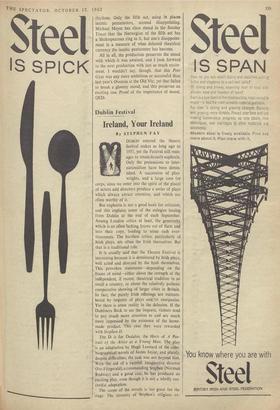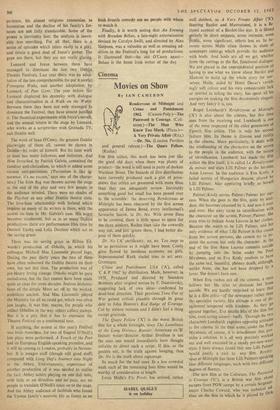Dublin Festival
Ireland, Your Ireland
By STEPHEN FAY
DUBLIN entered the theatre festival stakes as long ago as
1957, yet the Festival still man- ages to retain its early euphoria. Only the pretensions to inter- nationalism have been dimin- ished. A succession of play- wrights, and a large core (or corps, since we enter into the spirit of the place) of actors and directors produce a series of plays which always attract attention, and which are often worthy of it.
But euphoria is not a good basis for criticism, and this explains some of the eulogies issuing from Dublin at the end of each September.
Among London critics at least, the generosity which is so often lacking foams out of them and into their copy, leading to some rash over- statements. The harshest critics, particularly of Irish plays, are often the Irish themselves. But that is a traditional role.
It is usually said that the Theatre Festival is interesting because it is dominated by Irish plays, well acted and directed by the Irish themselves.
This provokes statements—depending on the frame of mind—either about the strength of the independent, if recent, theatrical tradition in so small a country, or about the relatively pathetic comparative showing of larger cities in Britain.
In fact, the purely Irish offerings are outnum- bered by imports of plays and/or companies. Yet there is some reality in the delusion. If the
Dubliners flock to see the imports, visitors tend to pay much more attention to and are much more impressed by the existence of the home- made product. This year they were rewarded with Stephen D.
The D is for Dedalus, the Hero of A Por- trait of the Artist as a Young Man. The play is an adaptation by Hugh Leonard of the auto- biographical novels of James Joyce, and plainly, despite difficulties, the task was not beyond him. With the aid of a careful, imaginative director (Jim Fitzgerald), a commanding Stephen (Norman Rodway) and a good cast, he has produced an exciting play, even though it is not a wholly suc- cessful adaptation.
The scope of the novels is too great for the stage. The intensity of Stephen's religious ex-
perience, his almost religious conversion to humanism and the decline of his family's for- tunes are not fully translatable. Some of the power is inevitably lost; the analysis is inevit- ably less searching. For all that, there is a series of episodes which relate easily in a play, and retain a good deal of Joyce's power. The gaps are there, but they are not really glaring.
Leonard and Joyce between them have managed to dominate the last two Dublin Theatre Festivals. Last year there was an adap- tation of the less comprehensible (to put it nicely) Finnegan Wake, and another adaptation, by Leonard, of Peer Gynt. The year before last Leonard displayed his dexterity with dialogue and characterisation in A Walk on the Water. Between them they have not only managed to dominate the Festival, they have almost justified it. The theatrical experiments with Joyce's novels, and the annual return to the stage by Leonard, who works as a scriptwriter with Granada TV, suit Dublin well.
The work of Sean O'Casey, the greatest Dublin playwright of them all, cannot be shown in Dublin—by order of himself. But his later work at least has many followers and imitators. And Him Stretched, by Patrick Galvin. contained the familiar anti-clericalism, to which is added some vicious anti-patriotism. (Patriotism is like ig- norance, its no excuse,' says one of the charac- ters.) The Irish flag was thrown across the stage at the end of the play and very few people in the audience minded. There were no shades of the Playboy or any other Dublin theatre riots. The love-hate relationship with Ireland which inspires so many of its writers is there, with the accent on hate in Mr. Galvin's case. His anger becomes incoherent, but as in so many Dublin productions there are performances (this time by Dermot Tuohy and Lelia Doolan) which act as the saving grace.
There was no saving grace in Hilton Ed- wards's production of Othello, in which his colleague Micheal Mac Liammdiir played Iago. During the past thirty years the two of them have often redeemed the Dublin theatre on their own, but not this time. The production was of pre-Henry Irving vintage. Othello might be pure melodrama, but the fact cannot have been made quite so clear for some decades. Jealous declama- tions of the simple Moor set off by the wicked, ambitious ancient. And Mac Liammoir played the Morality for all he could get, which was often just laughs. It was fine, maybe, for people who collect Othellos in the way others collect stamps. But it is a pity that it has to represent the Theatre Festival on a continental tour.
If anything, the accent at this year's Festival was Irish-Amerienn, for two of Eugene O'Neill's late plays were performed. A Touch of the Poet had its European English-speaking premiere, and it will be coming to London, probably in Novem- ber. It is meagre stuff (though still good stuff) compared with Long Day's Journey into Night at the Abbey. Unfortunately, experience of another production of it was needed to realise the fact. Abbey actors playing on one dull note, with little or no direction and no pace, are no
people to translate O'Neill's epics on to the stage. And the Abbey audience of faithfuls who found the Tyrone family's neurotic life as funny as an Irish fireside comedy are no people with whom to watch it.
Finally, it is worth noting that An Evening with Brendan Behan, a late-night entertainment devised by Carolyn Swift, and directed by Alan Simpson, was a valuable as well as amusing ad- dition to the Festival's long list of productions. It illustrated that—the old O'Casey apart— Behan is the finest Irish writer of the day.







































 Previous page
Previous page